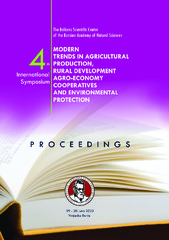Приказ основних података о документу
Maize yield depending on fertilization and soil compaction
| dc.creator | Biberdžić, Milan | |
| dc.creator | Barać, Saša | |
| dc.creator | Stojiljković, Jelena | |
| dc.creator | Madić, Milomirka | |
| dc.creator | Rajičić, Vera | |
| dc.date.accessioned | 2023-11-09T17:29:41Z | |
| dc.date.available | 2023-11-09T17:29:41Z | |
| dc.date.issued | 2022 | |
| dc.identifier.isbn | 978-86-6042-014-7 | |
| dc.identifier.uri | http://RIVeC.institut-palanka.rs/handle/123456789/781 | |
| dc.description.abstract | Soil fertility is a combination of mineral and biological properties of soil and the circulation of plant nutrients in the soil-plant system is constantly happening within it. In order for the root system to develop and function normally, it is necessary that there is enough oxygen in the soil. Only well-drained soils provide enough oxygen and good activity of microorganisms. Since most of the operations, from sowing to harvest, are performed with the help of heavy mechanization, soil compaction occurs and its structure deteriorates. Within compacted soil, there is a weaker development of the root system, weaker microbiological activity, slowing down the absorption of water and nutrients, thus slowing down the growth of plants. Growing plants on such soils result in reduced yields and increased production costs. The aim of this study was to determine the impact of manure and mineral fertilizers on soil compaction and maize yield. The experiment was performed on the territory of the municipality of Leskovac on smonica soil type. The experiment included four variants of fertilization with organic and mineral fertilizers. Compaction was measured after sowing and after maize harvest, by penetrologger Eijkelkamp hardware version 6.0, software version 6.03. The application of manure in combination with mineral fertilizers significantly reduced soil compaction. The greatest compaction was recorded at a depth of 40-50 cm, after which it stagnated and slightly decreased to a depth of 80 cm. The average compaction measured after harvest was 24.10% higher than that measured after sowing. The soil moisture content was higher on plots with manure and mineral fertilizers than on nonfertilized plots. Maize yield was significantly higher in variants where manure was used together with mineral fertilizers compared to variants with the only use of mineral fertilizers and variants without fertilizers. Variants with the lowest soil compaction achieved the highest yields. The recommendation to maize producers is to apply more organic matter on heavy and compacted soils, primarily manure, but also mineral fertilizers, in order to have high and stable yields. | sr |
| dc.language.iso | en | sr |
| dc.publisher | Belgrade: The Balkans Scientific Center of the Russian Academy of Natural Sciences | sr |
| dc.relation | info:eu-repo/grantAgreement/MESTD/inst-2020/200189/RS// | sr |
| dc.rights | openAccess | sr |
| dc.source | Proceedeings of the 4th International Symposium: Modern Trends in Agricultural Production, Rural Development, Agro-economy, Cooperatives and Environmental Protection, Vrnjacka Banja, Serbia 29 – 30. Jun | sr |
| dc.subject | soil compaction | sr |
| dc.subject | manure | sr |
| dc.subject | mineral fertilizers | sr |
| dc.subject | maize | sr |
| dc.subject | yield | sr |
| dc.title | Maize yield depending on fertilization and soil compaction | sr |
| dc.type | conferenceObject | sr |
| dc.rights.license | ARR | sr |
| dc.citation.epage | 253 | |
| dc.citation.spage | 241 | |
| dc.identifier.fulltext | http://RIVeC.institut-palanka.rs/bitstream/id/2507/bitstream_2507.pdf | |
| dc.identifier.rcub | https://hdl.handle.net/21.15107/rcub_rivec_781 | |
| dc.type.version | publishedVersion | sr |


